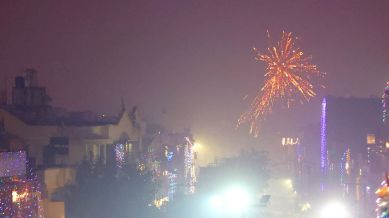Stay updated with the latest - Click here to follow us on Instagram
Consider perpetual ban on firecrackers in Delhi: SC to Delhi govt
Top court says restrictions on firecrackers were “hardly implemented” this Diwali, asks Delhi government and police to explain what measures were taken to ensure enforcement of the ban.

Proposing a permanent prohibition on firecrackers in the national capital, the Supreme Court Monday said the restrictions were “hardly implemented” this Diwali and asked the Delhi government and police to explain what measures were taken to ensure enforcement of the ban.
Referring to submissions made by amicus curiae Aparajitha Singh, who cited a report of the Centre for Science and Environment (CSE), a bench of Justices A S Oka and Augustine George Masih said it showed an increase in pollution levels in Delhi as well as a spike in farm fires during Diwali.
“There cannot be any dispute that the ban was hardly implemented. Moreover, the effect of the non-implementation of the ban is very apparent from the report of CSE, which shows that the pollution level in Delhi on Diwali in 2024 was at an all-time high. It was much higher than Diwali of 2022 and 2023. Moreover, the report indicates that even farm fires were on the rise during Diwali days,” the court observed, while also referring to media reports.
The bench directed the government to file “a detailed affidavit placing on record the orders banning the use of firecrackers and the steps taken… to implement the same”. It also issued a notice to the Delhi Police Commissioner asking him “to file an affidavit indicating the steps taken by the police to enforce the complete ban on the use of firecrackers in Delhi”.
The court further asked them to state “what effective steps they propose to take next year to ensure that the ban… is fully implemented” including measures to be taken to raise public awareness.
The court also asked authorities to consider a perpetual ban on firecrackers in Delhi. “In the meanwhile, the Government of Delhi and other authorities will also take a call on the issue of perpetual ban on use of firecrackers in Delhi,” the order read.
The court gave a week’s time to file the affidavits and fixed the matter for hearing next on November 14.
The amicus curiae submitted that according to the CSE report, there were 605 recorded incidents of farm fires on Diwali day, compared to 160 the day before. She added that the pollution percentage spiked from 10% to 30% on Diwali day.
Justice Oka said the problem with the lack of enforcement was that the Centre had done away with penal provisions under relevant laws for environmental pollution and there was only a penalty for it. The reference apparently was to the amendment made to Section 15 of the Environment Protection Act, 1986. While the unamended Section 15 made the violation of the Act a penal offence, the amended section, which came into force on April 1, substituted it with a provision for recovering a penalty for the contravention of provisions of the Act.
Justice Oka added that the court would, however, see in what manner the ban could be implemented and whether the premises of those selling firecrackers could be sealed.
Something has to be worked out,” he said and called for creating more public awareness ahead of Diwali. “People may bring crackers from other states also,” he added.
On the question of stubble burning, the court asked the Haryana and Punjab governments to inform it of how many such incidents happened in the last 10 days of October.
Expressing displeasure over the continuing instances of stubble burning, the court had earlier summoned the chief secretaries of the two states to explain what steps had been taken to stop the fires.